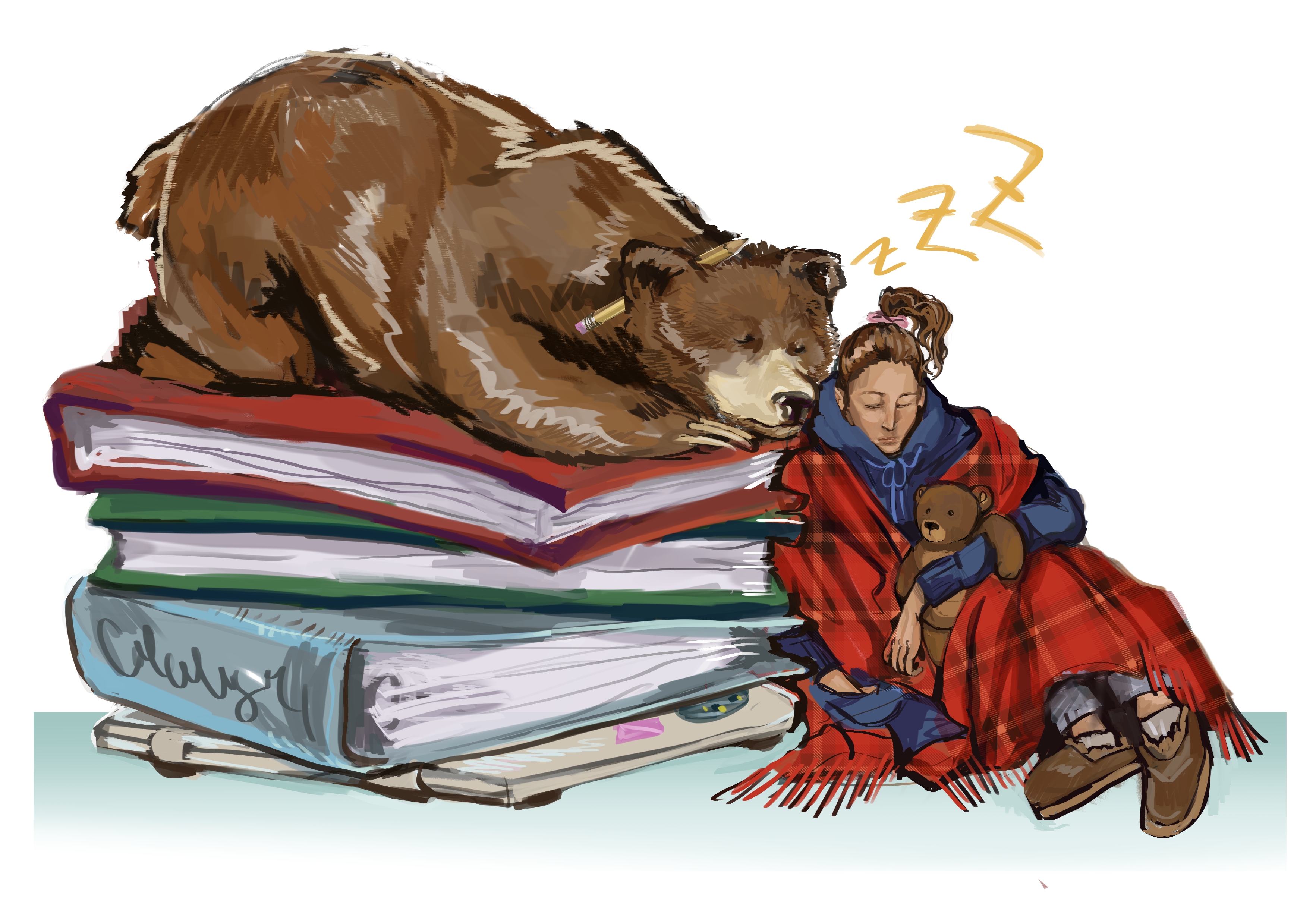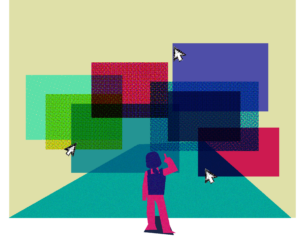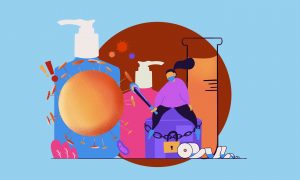As finals rise to our horizons, days get shorter, and the weather gets colder, there’s something magical and all too appealing about crawling into a cozy cave and sleeping until spring.
As it turns out, it’s a part of our body’s natural rhythm to slow down during winter months. Yet, stress culture and the structure of our school system causes these months to be the busiest times for us, with our newfound exhaustion making it even harder to achieve our goals. We need to implement structural and societal changes to live more attuned to our natural rhythm.
Hibernation in its true sense is when specific species of animals such as bears, bats, and frogs slow down their activity and metabolism during winter months. In truth, I’ve always been a little jealous of this natural retreat from winter stress. While humans technically do not hibernate, research has shown that the need for sleep is greater during winter months. The cold, shorter days and increased chance of illness force us to sleep more for our health.
But in reality, we’re not getting these vital hours. While 34% of US adults sleep more in the winter according to the American Academy of Sleep Medicine, about a third of adults are not getting enough sleep. An adult should get eight to ten hours of sleep, but according to the National Sleep Foundation, this is not the global reality. The average adult is getting just six hours and 49 minutes in the UK, six hours and 31 minutes in the US, and six hours and 22 minutes in Japan.
In part, modern life has eroded the emphasis of sleep. Electric light, technology, caffeine, and extended work hours have resulted in a significant reduction in sleep. While it’s great to have more time during the day, sleep and waking hours require a delicate balance. The results of this sleep deprivation are devastating and widespread. According to the Guardian, lack of sleep costs most developed nations 2% of their GDP, and it’s connected to increased rates of heart disease, type 2 diabetes, and obesity. According to a New York Times piece on sleep deprivation, it makes us angrier, less happy, and increasingly incapable of forming creative, compassionate, and intelligent thoughts which author Tish Warren suggests, “is likely making outrage culture, political polarization and general incivility worse.” Sleep deprivation replaces some of the most beautiful parts of humanity with some of the ugliest. When taking care of yourself, you really are taking care of others.
As a student, balancing school work, club culture, a social life, and sleep is virtually impossible. And right as winter begins its wrath, things just get busier. Midterms, finals, and major events mark the end of the semester and the start of the winter season, throwing off any balance of social, academic, and restful life previously established. For me and many of my peers, sleep is the first thing to go.
Furthermore, Seasonal Affective Disorder (SAD), a form of depression increasingly common among women and young people, is a clear threat to any college population in the winter. Those who have SAD sleep two hours longer per night in the winter compared with summer and additionally feel excessively sleepy during the day. The stress of exams and essays, with worsening mental health and heavier urges to sleep, make a dangerous combination. College students, especially those experiencing SAD, simply cannot catch a break during these winter months.
This cultural and almost systemic sleep deprivation speaks to a societal lack of respect or concern for our body’s natural rhythm. We could be doing more to structure our lives in favor of our physiological needs, and in turn be happier, healthier. The French government, for example, imposed a law giving workers the right to disconnect from emails out of hours, encouraging a greater work–life balance and emphasis on rest.
But for much of the work force and for many students, sleeping and wellness is not a permitted priority. Huffington Post founder Arriana Huffington collapsed from exhaustion ten years ago, which catalyzed her mission to destigmatize sleep. Her book The Sleep Revolution explains how, professionally, sleep is seen as a sign of weakness while burnout and sleep deprivation are seen as a sign of strength and productivity in a stress-culture environment.
While productivity is one of the biggest hindrances to sleep, listening to our bodies will actually help our productivity instead of hurting it. Recently, there has been a push for employers to allow more flexible work hours, suiting different types of sleepers. A “morning person” might prefer earlier hours and an early leave, whereas a “night owl” might want to come in late and work late. Rather than punish these natural urges, workers can lean into them and have a more personalized schedule that can enhance their productivity. Additionally, Microsoft’s Japan branch reduced the workweek to 4 days rather than 5, boosting productivity by a staggering 40%. This was especially important in Japan, where employees face long working hours and high rates of stress. After the study, 97% of staff reported positive changes in their lifestyle.
It’s time to respect our body and ourselves, starting with respecting and destigmatizing sleep.
It may seem impossible to find ways to get more sleep in such a high stress, high activity environment. For me, even if my time and schedule permit a full eight-hour night of sleep, the urge to doom scroll or engage in revenge sleep procrastination, a decision to delay sleep in response to stress or lack of free time during the day, is often high. However, even if classes start early or doing work goes late, naps can be a viable source of sleep and a way to hit a reset on a bitter, exhausting day. Just a twenty to thirty-minute nap can help you feel more refreshed and alert. The Sleep Foundation found that naps can improve physical performance, reduce cardiovascular problems, relieve stress, and boost the immune system. This may be the best solution for our current environment, but in the long run, structural change promoting greater REM sleep should be our main focus.
While I tend to put sleep on the back burner to make way for other priorities, lack of sleep will eventually erode the ability to focus on these other tasks. Especially as I try to complete assignments under a state of exhaustion, the quality of my work and later recollection of class-related content is undoubtedly harmed. Not to mention, I become a worse friend as I find myself increasingly irritated by the world and removed from my surroundings. This winter, it’s time to learn from those sleepy bears and foster a little human hibernation. Take naps, rest more, and encourage your peers to do the same. Your health, mind, social life, and grades will thank you.




